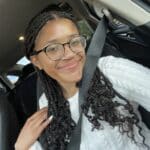Ayana and Amaya
Pittsburg, CA
2023, Senior, Creative Writing
Climate Hero: Ayana Elizabeth Johnson, Ocean Collectiv & Urban Ocean Lab
Brownsville is perhaps the most notorious neighborhood in Brooklyn, New York. Even the proudest of New Yorkers do their best to avoid the area due to its high crime rate and homeless population. But to Amaya Jenkins, Brownsville was home. She had lived there her whole life. Her first childhood memory wasn’t a birthday party, her first day of school, or a family vacation. Her first memory was taking a photo with her mom in front of her Brownsville street sign.
Of course, there was one flaw Amaya couldn’t deny about Brownsville: the never-ending pollution. The streets were always packed with trash. Plastic bags, plastic straws, cigarette butts… they never left Brownsville. Even with all the time she spent living in Brownsville, she had no memories of a clean Brownsville.
As soon as Amaya stepped outside the poor, dirty streets of her neighborhood and into her private high school in the Upper East Side, it felt like she traveled to a different dimension. The Upper East Side was always clean. They could afford to keep it clean. In Brownsville, the last thing on people’s minds was land pollution.
Amaya fully relied on her scholarship to put her through private school. After all, there was no way a teenage girl from Brooklyn could afford to attend private school on her own. Amaya’s fancy school uniform felt like a poorly designed costume. She couldn’t quite wear it the same way the other Upper East Siders could.
When Amaya arrived at her first period class one morning, everything was as usual. Her teacher, Mrs. Garcia was busy typing away at her computer. Textbooks lined the shelf at the front of the classroom. Streams of light shone through the window curtains. And no one sat beside her.
She immediately took out her laptop from her backpack, already prepared for her daily school routine. But before she could flip her laptop open, Mrs. Garcia clapped her hands together, instantly calling everyone to attention.
“Class! Today, I am proud to announce that we will be going on our first surprise field trip of the semester! We already informed your parents of these plans a week prior, and each of them signed a permission slip for you,” Mrs. Garcia announced.
This news was met with “oohs” and “ahhs” from all the students. Amaya, though, remained quiet, curious as to what the field trip could be about. She imagined an amusement park like Disneyland or a visit to the local zoo, both of which excited her immensely.
“Today, we will be attending a TED Talk here in New York City. The guest speaker for this TED Talk will be Ayana Elizabeth Johnson, a prominent climate activist, marine biologist, and New York native,” Mrs. Garcia proclaimed.
Amaya’s heart fell. Of course she was being forced to attend some boring lecture. If Amaya’s mother found out she did not want to go, she wouldn’t hear the end of it. Her mother already knew full well that Amaya hated her school and found it difficult to fit in. Amaya didn’t want to disappoint her mother any further.
Reluctantly, Amaya boarded the bus with her classmates. Every seat on the bus was occupied except for the one next to hers. Amaya sighed in her seat and buried her nose in her book and her ears in her headphones.
In less than 15 minutes, Amaya’s class had reached their destination. They all gathered into a single file line at the entrance of the venue. It wasn’t long before the students made their way inside the venue and took seats next to each other near the front row.
Looking around, Amaya was shocked. The auditorium was absolutely packed. Her eyes fell on the faces of each audience member. She could tell they came from all over the world just to view this TED Talk. She couldn’t believe it. How could so many people care to attend some long, boring lecture about climate change?
The speaker was probably just another old, rich, white guy from the Upper East Side who thought he could relate to the experiences of young Black girls like Amaya. Too many times, Amaya heard adults telling her how important it was to care about the environment. Of course, Amaya wanted better for her Earth. Hell, she wanted better for her own neighborhood. She was tired of seeing her home inundated with trash. But she was just one person in a world of over eight billion humans. How could her actions alone possibly make a difference?
Suddenly, the lights went dark and everyone went quiet. Amaya squirmed in her seat. She was already looking forward to getting out of there.
A spotlight shone in the center of the stage. Out stepped a slender Black woman with a thick, curly afro and round glasses. Although she looked to be in her mid- to late 40s, she radiated a youthful and vibrant energy that Amaya had never sensed in anyone else before. She looked just like Amaya.
“Hello, everyone. My name is Ayana Elizabeth Johnson,” the woman announced with a smile. She was immediately met with applause from the audience.
“Many of you may know me as a marine biologist, climate activist, the founder of Ocean Collectiv, or even as a podcaster. But I have always known myself as just an awkward Black girl from Brooklyn” (Pattillo).
While the rest of the audience chuckled, Amaya was stunned into silence. As weird as it sounded, she felt like she was the one on stage delivering a speech. Ayana Elizabeth Johnson was not anything close to a rich, old, white guy from the Upper East Side. She was just another Black girl from Brooklyn, New York.
“You see, I was brought up in a working-class family in Brooklyn, so the only vacation we could ever afford was one summer in the Florida Keys. I learned to swim there, and when I went on a glass-bottom boat ride for the first time, I was so mesmerized by the beauty of what lay beneath the ocean surface. I wondered why nobody had told me that a whole other world existed underwater. That was the moment I realized the ocean was my passion (Pattillo).
“The funny thing is the ocean does not need us. But we need the ocean. And yet, we don’t act like it. From a young age, I made a commitment to protect the ocean that protects us. As a marine biologist, I worked for the Environmental Protection Agency straight out of college. I spent a decade working with fishing communities in the Caribbean. I worked as an ocean conservationist under the Bush administration. I served as a professor at New York University. I published a book, All We Can Save, about female voices in the environmental movement (“Ayana”).
“And still my work feels nowhere near done. I feel it is my personal obligation to encourage others to be climate activists, too. Anyone can be an activist. It does not matter how old you are, where you are from, or who you were raised by. You can be an activist. It is easy to think of ourselves as one person, but one person adds up. We all make an impact. It’s up to each one of us to decide whether or not that impact is positive.”
Amaya could feel chills run down her spine. She felt ashamed of her defeatist mindset. Ayana made climate activism seem so accessible and important. It’s people like Amaya who unfortunately contribute to the climate issue due to their ignorance.
When Ayana concluded her speech, the whole audience gave her a standing ovation, including Amaya. She clapped her hands so hard and for so long that they began to ache. Amaya’s class each took turns shaking hands with Ayana and thanking her before they left. When it was Amaya’s turn to shake Ayana’s hand and thank her, she practically froze. Rather than skip past her, Ayana simply gave her a warm hug and said to her, “I wish you well.” After Ayana took the bus home from school and got off at her last stop, she decided to pick up some of the trash on the ground instead of ignoring it like she usually did. After all, everyone has an impact.
Works Cited
“Ayana Elizabeth Johnson.” Hearts on Fire, www.heartsonfire.org/ayana-elizabeth-johnson-ayana-elizabeth-consulting-llc. Accessed 16 May 2023.
Pattillo, Ali. “How a Young, Black Marine Biologist Turned Imposter Syndrome into Real Change.” Inverse, 5 Oct. 2020, www.inverse.com/mind-body/ayana-elizabeth-johnson.

Reflection
Reflection
I have always been deeply inspired by Ayana Elizabeth Johnson's work, especially as a young Black girl. I first learned about her through the How to Save a Planet podcast on Spotify. I don't see many girls who look like me involved in the global environmental movement. So I particularly admire Ms. Johnson for bringing much-needed diversity into the environmentalist space. I hope that readers can also come to admire Ms. Johnson as much as I do and realize the true extent of her work. I enjoy writing just as much as I enjoy environmental science, so it brought me so much joy to combine two of my greatest passions together in this process.

